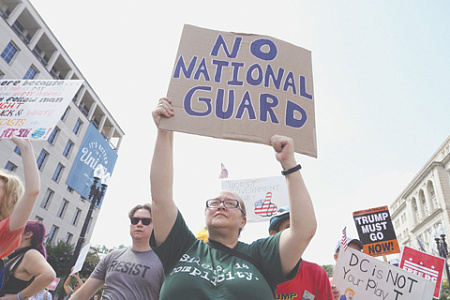
In a move that has sent shockwaves across the American political landscape, President Donald Trump has ordered National Guard troops into Washington D.C., a decision that has deeply polarized the nation. While supporters applaud the action as a necessary step to restore order, critics are condemning it as an unprecedented assault on the foundations of American democracy. The president’s team insists the move is well within his constitutional powers and has signaled its readiness to defend the decision in court.
Under the directive, a state of emergency has been declared in the District of Columbia, placing local police under federal command and bringing 800 National Guard soldiers onto the city’s streets. President Trump has publicly framed the deployment as a mission to tackle local crime and improve safety in the capital. More ominously for his opponents, he has indicated that Washington is just the beginning, pointing to other major cities like Chicago, Los Angeles, and New York as potential next targets. A significant, and widely noted, detail is that all the cities mentioned are political strongholds of the opposition Democratic Party.
The official justification of a crime crisis is being intensely debated in the American media. While the U.S. does have cities with significant crime-related challenges, those named by the president do not typically top the lists of the nation’s most dangerous. This discrepancy has fueled accusations that the crime narrative is a convenient pretext. Specific justifications, such as Washington’s homeless population or past unrest involving undocumented migrants in Los Angeles, are seen by critics as further evidence of a politically motivated agenda rather than a genuine public safety emergency.
For many Democrats, this action is not an isolated incident but a deliberate escalation. They point to a previous deployment of the National Guard in Los Angeles as a ‘trial run’ for using military force to override local authorities. The rhetoric from the opposition has sharpened, with many now openly accusing President Trump of harboring dictatorial ambitions and attempting to consolidate power. The legality of the move is also under a microscope; while the president can declare an emergency for 48 hours, any extension requires Congressional approval, which is far from guaranteed.
Political analysts suggest that the stated focus on crime may be a smokescreen for broader strategic goals. The deployment is being widely interpreted as a preemptive move to quell anticipated mass protests and to assert federal authority ahead of contentious election cycles. Rather than a simple law enforcement operation, many observers see this as a powerful message from the president: that he is prepared to act decisively and test the boundaries of the American political system to maintain control, setting a potentially volatile precedent for the country’s future.
